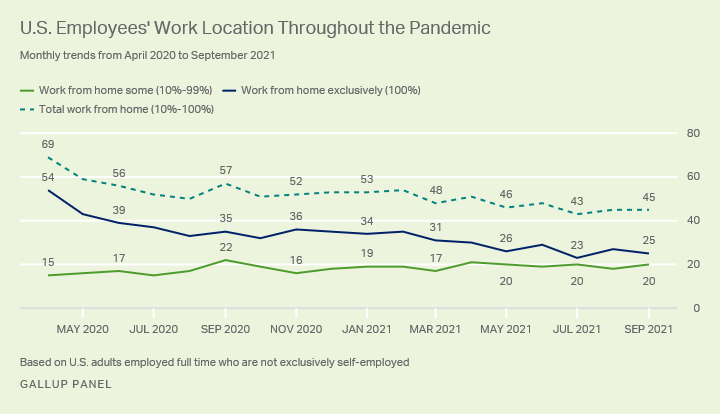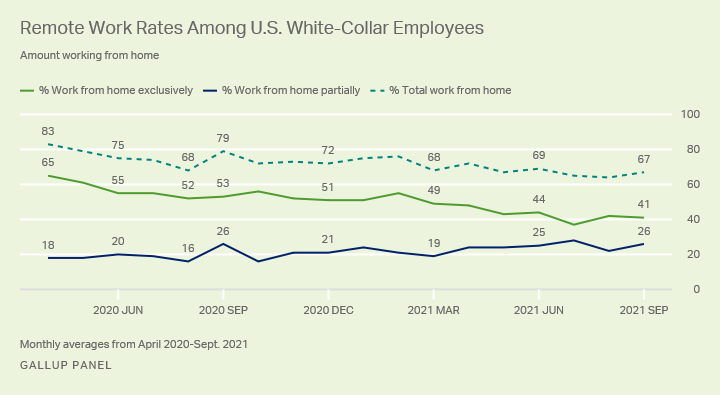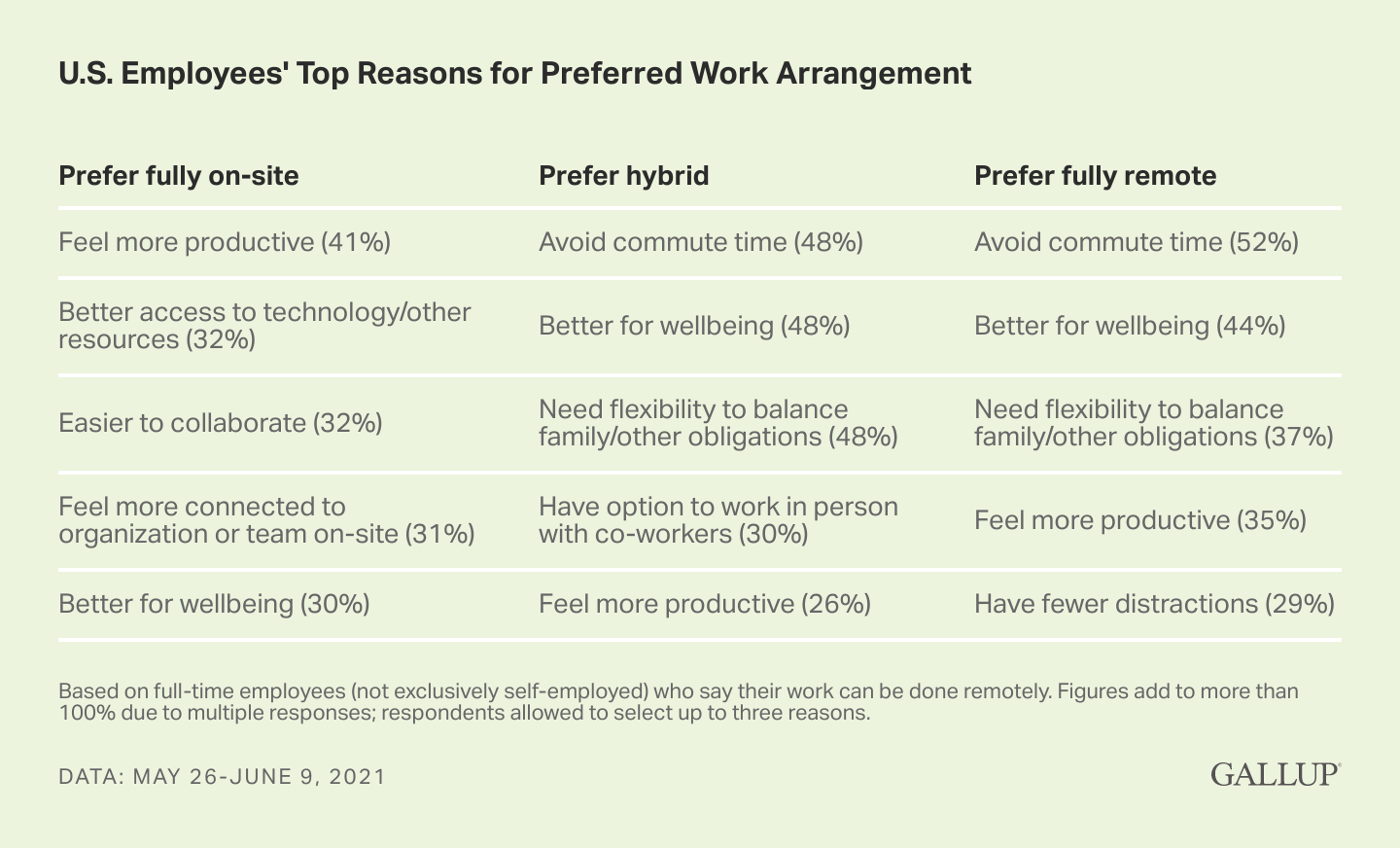Story Highlights
- 45% of full-time employees working partly or fully remotely in September
- Nine in 10 remote workers want to maintain remote work to some degree
- Same number anticipate keeping remote hours for rest of the year and beyond
WASHINGTON, D.C. -- Forty-five percent of full-time U.S. employees worked from home either all (25%) or part of the time (20%) in Gallup's September update of its monthly employment trends. These figures are unchanged from remote working rates in July and August, signaling that U.S. companies' return-to-office plans remain on hold.

Line graph. Monthly trend from April 2020 to September 2021 in amount U.S. employees are working remotely/from home. Most recently, 25% worked exclusively from home, and 20% worked some of the time from home, for a total of 45% working remotely. These rates have been steady each month since July. The overall percentage working remotely was highest last April, at 69%, before trending down to just over half by October 2020.
Given the high proportion of white-collar jobs traditionally done in an office, the remote rate among these workers is particularly noteworthy. Two-thirds of employees in white-collar jobs (67%) reported working from home either exclusively (41%) or some of the time (26%) in September,
As with the rate of remote work among all full-time employees, remote working among white-collar workers has been steady in recent months. However, the percentage has dwindled since January's 79% as the vaccination rate among Americans has increased, giving more people the confidence and freedom to return to the office.

Line graph. Monthly trend from April 2020 to September 2021 in amount white-collar workers in the U.S. have been working remotely, from home. Most recently, 41% were working exclusively from home and 26% partially from home, for a total of 67% working from home to some degree. The overall percentage working remotely was highest last April, at 83%. It varied for several months before steading near 75% in January. It fell to 68% in March and has since held near that level.
In contrast to the high rate of remote work in white-collar professions, working remotely is far less prevalent among workers with interactions that typically occur in person, such as in education (48%) and healthcare (35%).
Gallup's trends on remote work are based on Gallup's COVID-19 survey conducted via web surveys using the nationally representative, probability-based Gallup Panel. The latest results are based on adults employed full time who work for an employer (are not exclusively self-employed) interviewed in mid-September.
Employees See Many Advantages to Remote Work
Separately, Gallup's State of the Workforce study conducted in May/June with more than 9,000 American workers finds strong reasons for employers to consider bringing remote workers back to the office in a hybrid fashion -- spending part of the week at home and part on-site.
Most notably, the study reveals that:
-
Employees hope remote is here to stay.
-
91% of workers in the U.S. working at least some of their hours remotely are hoping their ability to work at home persists after the pandemic.
-
-
Hybrid work is most preferred.
-
Overall, 54% of employees who work remotely at least some of the time say they would ideally like to split their time between working at home and in the office -- a hybrid arrangement. A little over a third (37%) would like to work from home exclusively, while 9% want to return to the office full time.
-
Nearly half of fully on-site employees whose job can be done remotely wish they could work partially (37%) or exclusively from home (11%).
-
-
Time preservation is a key reason for wanting to work remotely:
-
Not having to commute, needing flexibility to balance work and personal obligations, and improved wellbeing (which likely results from having more time) are the top-cited reasons for preferring remote work.
-
-
Employers are at risk of losing talent if they do not allow remote work.
-
Three in 10 employees working remotely say they are extremely likely to seek another job if their company eliminates remote work.
-
-
Most workers don't foresee remote work harming company culture.
-
While most workers don't think remote work will improve their office culture, they don't think it will hurt it either. Two-thirds of all full-time U.S. employees think that having people work remotely long term will have either no effect or a positive effect on their workplace culture; the remaining third think it will be negative.
-
-
Hybrid looks like the way of the remote future.
-
76% of remote workers say their employer will allow people to work remotely going forward, at least partially.
-
61% of remote workers say they anticipate working hybrid for the next year and beyond; 27% expect to be fully remote.
-
DETAILED FINDINGS
Workers Overwhelmingly Desire the Flexibility of Some Remote Work
When asked what their preferred work location would be going forward, 91% of remote workers interviewed in May/June (those fully and partially remote, combined) indicated they wanted to be hybrid (54%) or exclusively remote (37%). But the amount employees wanted to work remotely differed according to their work situation:
-
Those working from home full time were divided between wanting to remain fully remote (49%) and preferring a hybrid arrangement (45%). Just 6% said their ideal was to be fully on-site.
-
By contrast, 70% of those working remotely part of the time would prefer a hybrid arrangement; the rest were divided, at 15% each, between wanting to be fully remote or fully on-site.
-
Those working on-site full time, but whose job can be done remotely, were evenly split between wanting to continue to work on-site (52%) and wishing they could work hybrid (37%) or exclusively from home (11%).
| Prefer exclusively on-site |
Prefer hybrid | Prefer exclusively remote |
Total prefer remote |
|
|---|---|---|---|---|
| % | % | % | % | |
| Remote workers | ||||
| Working from home exclusively | 6 | 45 | 49 | 94 |
| Working partially from home/partially on-site (hybrid) | 15 | 70 | 15 | 85 |
| Total working remotely (hybrid or exclusively) | 9 | 54 | 37 | 91 |
| Potential remote workers | ||||
| Working on-site, but job can be done from home | 52 | 37 | 11 | 48 |
| Gallup Panel, May 26-June 9, 2021 | ||||
In summary, most employees working hybrid want to continue working hybrid (70%). About half of exclusively remote workers (49%) and 37% of those on-site in a job that could be done remotely would prefer hybrid.
Commute Time, Wellbeing and Flexibility Are Top Reasons to Work Remotely
When asked to name the top three reasons for their work location preference, those who say hybrid or exclusively remote work is ideal are most likely to cite the lack of commute time. Improvements to their wellbeing and the flexibility it affords are the next two highest-ranked reasons.
At the same time, those who prefer exclusively remote work uniquely mention "having fewer distractions" as a top perk. This speaks to the advantage of having more focused work time when working entirely from home. Conversely, those who prefer hybrid work uniquely mention getting to "spend time in person with coworkers," which speaks to the opportunities for interpersonal connection and collaboration afforded by this type of flexible work arrangement.
Meanwhile, employees who would prefer to be fully on-site chiefly name productivity as the top reason for that choice, followed by better access to technology and easier collaboration with others.
Personal productivity and wellbeing make it into the top five reasons across all three location preferences, underscoring that workers' productivity and wellbeing needs are met differently. Where people work best is highly individualized and dependent on the type of work they do -- and how much collaboration time they require.

Table showing U.S. employees top reasons for why they prefer to work either fully on-site, fully remote, or hybrid (partially on-site and partially remote). Those who prefer to be on-site are most likely to say it makes them feel more productive (41%), followed by having better access to technology (32%), finding it easier to collaborate (32%), feeling more connected to their organization (31%), and saying it's better for their wellbeing (30%). The top three reasons for those preferring to be fully remote are avoiding commute time (52%), saying it's better for their wellbeing (44%) and needing flexibility to balance family and other obligations (37%). The top three reasons for those preferring to be hybrid are the same, with 48% naming each. Additionally, 35% of those preferring to be fully remote say they feel more productive and 29% cite having fewer distractions. Among those who prefer hybrid, 30% cite having the option to work in-person with coworkers and 26% say they feel more productive.
Hybrid Workers Disagree on How to Coordinate Office Time
Managing hybrid workers, many of whom grew accustomed to working exclusively from home over the past year, may take some finesse. There is little agreement among employees regarding how often and when they want to go to the office.
When asked how often they want to work on-site in a hybrid setting, 38% said they preferred to spend 2-3 days in the office. In contrast, 37% want to spend less than 2-3 days on-site, and 24% would like to be in the office more often than 2-3 days per week.
When asked how they want their time in the office to be determined, nearly four in 10 employees (38%) who want a hybrid arrangement going forward desire complete flexibility and autonomy in those decisions. This group wants the decision about how many days, and which days, to be on-site each week left entirely up to them.
In contrast, the remaining six in 10 would rather have their employer, manager or team establish clear guidelines for being in the office:
-
24% would prefer their employer requires a certain number of days per week to be on-site.
-
16% would prefer their employer to require all members to be on-site a few specific days per week but leave the rest up to the employee.
-
22% want their manager or team to coordinate schedules so that everyone is on-site together for at least one day per week.
Mixed Predictions For Impact of Remote Work on Work Culture
The majority of full-time U.S. employees are unconcerned about the effect that remote work could have on their company's culture. Among all workers, 54% believe the culture of their company would be the same if a substantial number of employers worked remotely long-term, and 12% think it would be better, while 33% predict it would be worse.
Employee views on the culture question differ according to workers' current remote work status -- the more employees work from home, the more upbeat they are about the potential effect of remote work on company culture. By contrast, exclusively on-site workers are divided, with 49% believing that having people work remotely long-term would make the culture worse, while 7% say it would be better and 44% say it would be about the same.
Will Calling Workers Back Drive Them Away?
About three in 10 remote workers (31%) say that losing the option of working from home, should their employer remove it, would make them extremely likely to look for employment with another organization. That stretches to 49% when factoring in those rating their chance of leaving a "4" on the five-point likelihood scale.
The inclination to leave over losing the ability to work remotely is higher among employees working exclusively from home (37% describe themselves as "extremely" likely to look for another job) than among those working partially from home (19%).
| Currently fully remote | Currently hybrid | Currently fully on site | |
|---|---|---|---|
| % | % | % | |
| 5 (Extremely likely) | 37 | 19 | 11 |
| 4 | 17 | 19 | 8 |
| 3 | 17 | 19 | 17 |
| 2 | 10 | 12 | 14 |
| 1 (Extremely unlikely) | 19 | 30 | 50 |
| Gallup Panel, May 26-June 9, 2021 | |||
Remote Workers See Hybrid in Their Future
Three in four employees who were working remotely exclusively or part of the time in September indicate that their employer will allow people to continue working from home on some basis.
For now, an even higher percentage of remote workers expect to be working from home for "the rest of the year and beyond." About a quarter (27%) plan to do so exclusively, and another six in 10 (61%) plan to do so part of the time. Just 9% anticipate working a minimal amount from home or not at all.
| All remote workers | Exclusively remote | Partially remote (hybrid) | |
|---|---|---|---|
| % | % | % | |
| Exclusively remote (100%) | 27 | 47 | 2 |
| Hybrid (10%-99%) | 61 | 49 | 77 |
| Not remote (>10% or never) | 9 | 3 | 16 |
| Not sure | 3 | 1 | 5 |
| Gallup Panel, Sept. 13-19, 2021 | |||
Looking at the U.S. workforce at large, regardless of where people are currently working, the poll finds that 13% of all full-time employees plan to work exclusively from home, 31% plan to work hybrid and 52% plan to work fully on-site, with 4% unsure.
Bottom Line
Pre-pandemic normalcy remains elusive, but a new normal has settled in among workers who have grown accustomed to working from home -- commuting less and enjoying improved wellbeing and flexibility. Nearly half of full-time employees in the U.S. (45%), including two-thirds of white-collar employees (67%), are still working from home to some degree. The good news for these workers -- who overwhelmingly do not want to return to the office full time -- is that their employers largely foresee making remote work a permanent offering, at least on a hybrid basis. Leaders and managers may recognize the many benefits of remote work, along with the risk of losing top talent if remote work flexibility is taken away.
Employers may still worry about the effect remote work has on company culture, but most workers do not share this concern. The greater risk to culture could be not providing options for work location flexibility that match what employees desire and make them more productive. Gallup research suggests that a mismatch between where employees work best and where they are required to work could impair employee engagement, and ultimately, employee retention.
Jeffrey M. Jones and Sangeeta Agrawal contributed to this report.
To stay up to date with the latest Gallup News insights and updates, follow us on Twitter.
Learn more about how the Gallup Panel works.




